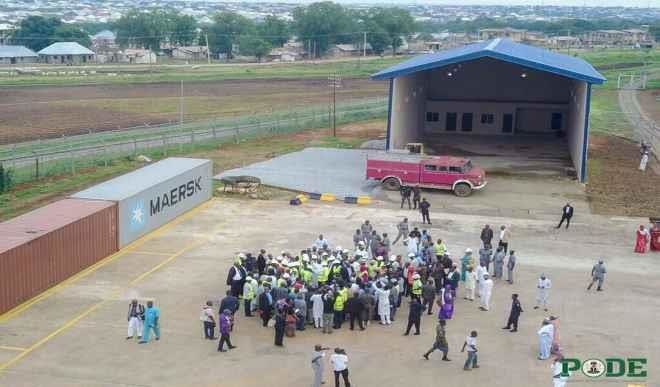I read in a recent Daily Trust interview with Hassan Bello, the Executive Secretary of the Nigerian Shippers Council (NSC), about things that are making the recently-commissioned Kaduna Dry Port working. Now, I’ve always followed the man’s activities keenly, for a number of reasons. One, is that he’s among the few professionals in the country today, who are clearly dedicated, and focused on their tasks with admirable intensity. Ironically, other professionals I admire include Customs boss Hameed Ali, and Nigerian Ports Authority maven Hajiya Hadiza Bala Usman, all of related areas of our economy. Anyway, I digress. Back to the topic I want to discuss, especially the Kaduna Dry Port: I was relieved to read that there was a meeting last week, with the Nigerian Railways Corporation (NRC) with the concessionaire of Jos Inland Container Depot (ICD), Duncan International. As an importer myself, I cannot begin to enumerate how much ease this development will introduce into my business activities, or the amount of peace-of-mind it will avail me, and many, many others.
The idea of laying the tracks going to the ICDs is a smart one, but honestly I was not happy to hear that the process of laying of the tracks are yet to resume. But I’m sure that’s a minor speed bump which will eventually be smoothened out. But back to the part that concerns me directly, which is the Kaduna ICD, I am very happy with the operation there. Some of my fellow businessmen have even started receiving containers via the Kaduna ICD. In a time of poor security, and at a time when technology has shortened many hitherto-cumbersome processes, the time for the Kaduna ICD is most definitely now.
I can also attest to the fact that the Nigerian Customs have been very cooperative, and I was delighted to see that they have already provided the station code to Kaduna and they are also training the Kaduna dry port staff, which will ensure seamless clearance of goods. But perhaps what I’m most excited for, is the railway, prodded by the news that the NRC promised to allocate 20 train wagons for goods to be moved to Kaduna. For those of us harbouring dreams of going global, you can imagine how heartening the news was that the concessionaire for Kaduna Dry Port is opening offices in London, and China, to solicit for cargo.
Now that I know that I can clear goods in Kaduna without going to Lagos, where else do you think I will use? Then, kudos must also go to the state government, which is also providing a lot of support to make sure there is a seamless operation. All these factors, adding up, make it no wonder that Kaduna is a success story already. And while I’ve had issues with rail track not being connected to the Kaduna Dry Port, leaving Kaduna-bound cargo left to be trucked from Lagos, I of course had additional ones with security, safety, and even tampering: But in the Daily Trust interview, the NSC boss said while there are challenges of security, Customs are also very sensitive of diversion because the duties are accessed in Kaduna. He said: “The Nigerian Shippers Council is also coming up with a tracking mechanism to track containers from the seaports to the dry ports so that no container will be missing. We are also ensuring no cargo is tampered with.” You can only imagine my relief at that statement.
I have always been a proponent of the Federal Government setting up a lab where investors will go and submit their proposals for investments. So when I read that TTPs have been on top among the interest shown by investors, local and international, I was again happy. Thank God, the NSC is in the process of working with the ICRC to deliver the processes soon this year.
It also interested me greatly when I read that Bello chaired the committee on National Transport Commission, which is currently working with NEXIM Bank. He said: “Very soon, we will have a company we will be working with. They will concentrate on inter-African trade. What our committee would do is to recommend they are accorded national carrier status. We are also working with NIMASA and the NNPC who are members of our committee. When we first started, we called for private participation but at that time, there were no takers. The national carrier is not just bringing ship but sustainability. Sustainability in terms of ship repairs and all. We also have to look at our nautical colleges like the MAN Oron and make them sustain the national carrier. The banks and insurance companies also have key roles and all that. The ship registry too is key.” And the best part, for me? He added that it will be private sector-driven.
While in the next five years, the hope is that the NSC will have its regulatory duties well spelt out in law, in the National Transport Commission, it is not the NSC alone that will constitute the NTC. I am glad that among things being considered, is that other agencies that have expertise in other areas will be co-opted. By the time expertise is drawn from aviation, NPA, railways and others, capacity and competence will win the day. And the winners, ultimately, will be Nigerian businessmen or partners from abroad, and the nation as a whole. I repeat: The time is definitely now.
Bello wrote in from Zaria.

 Join Daily Trust WhatsApp Community For Quick Access To News and Happenings Around You.
Join Daily Trust WhatsApp Community For Quick Access To News and Happenings Around You.


